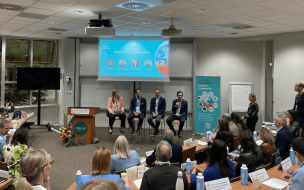As US President, Donald Trump, and North Korea’s Supreme Leader, Kim Jong Un, put down their yo-yos and finally meet face-to-face after months of will-they-won’t-they speculation, the world will be treated to a live case study in the ‘art of the deal’. Or so we hope.
When the clock chimes 9am local time in Singapore, on Tuesday 12th June, the two leaders will be sitting down, each with their own agenda.
President Trump wants complete denuclearization of the Korean peninsula. From the North Korean side, the end goal has been less lucid, but denuclearization would have to be accompanied with a security guarantee, and a ‘new relationship with the US’.
In anticipation of the Trump-Kim summit, BusinessBecause caught up with professors from Carnegie Mellon University’s Tepper School of Business, and Georgetown University’s McDonough School of Business, to talk about the lessons MBA students can learn about negotiation from watching the two leaders.
“The summit, as well as the build-up, have certainly provided a learning opportunity for Tepper students in that the strategies and planning have all played out publicly,” says Leanne Meyer, executive director of the Accelerate Leadership Center at Tepper School of Business. “And in a 24-hour news cycle, and through social media, our students have been given front row seats to this negotiation.”
The style of these negotiations is what Leanne finds interesting. The US President is renowned for his belligerent, unilateral approach to geopolitics, and so what we’ve seen in the build-up to the summit is an attitude “which has more of a competitive nature as opposed to a collaborative style,” Leanne continues.
But, that style has landed Donald Trump a seat at the table with his North Korean counterpart, something no other US President has been able to achieve.
Now that he’s there, Leanne says MBA students can “get to understand the notion of ‘anchoring high’ in a negotiation. President Trump’s style tends to anchor high or go in with a big ask and keep pushing from that vantage point.
“[He] also indicates the concept of BATNA (best alternative to a negotiated agreement)—who has power in a negotiation. When you feel powerful, as in you are bigger than everyone else, you can walk away from a deal or agreement when at times others do not have the same leverage.”
Approaching these negotiations with the same attitude comes with a major caveat. “A concern is that President Trump seems to minimize the importance of preparation,” explains Leanne, “implying it’s about attitude, and can be determined in the first few minutes of a negotiation.” At Tepper though, she says that they teach students that preparing for negotiations is paramount to their overall success.
Cathy Tinsley, professor of management at Georgetown University’s McDonough School of Business, agrees. “Negotiations are best served if the negotiator and their team do a lot of preparation ahead of time,” she says.
It’s also good to change up the players, she adds. “I think the fact that this is taking place in the context of several failed negotiations [by past Presidents] shows that all negotiations have linkage effects.”
The US’s National Security Advisor, John Bolton almost scuppered the summit for the current administration when he said in a TV interview in May that the Libyan model of unilateral disarmament could work with North Korea—for those who need their memories jogging, Libyan leader Muammar Gaddafi was overthrown and killed.
This caused outrage to the North Koreans and was evidence of the US being unable able to take on the perspective of the other party.
“How tone deaf can you be?” Cathy asks, “how incredibly unempathetic to do that sort of thing.”
The good cop/bad cop approach works in some situations, she explains, but here what needs to occur is relationship building with the party across the table. “What I think both are doing well is cultivating power, but what they’re doing less well is trying to find out the other sides’ true underlying interests.”
It is possible for that to come later however. The best thing President Trump has done recently is downgrade the expectations of the meeting to a meet-and-greet, rather than a be-all and end-all for US-North Korean relations.
“It’s difficult to judge these negotiations,” Cathy admits. “But, that being said, negotiations are not just about forcing the other to your will but about building and establishing credibility, mutual concern, trust, and that’s where a friendly meeting can make both sides feel better about themselves, and lead to a second meeting that can be more productive.”
Student Reviews
Carnegie Mellon: Tepper
RECAPTHA :
c0
20
dd
03








